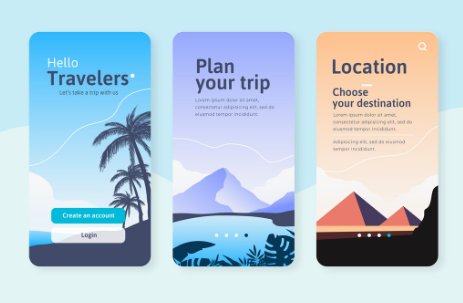Introduction: The AI Shift in Mobile Travel
Artificial Intelligence (AI) has moved beyond the realm of chatbots and recommendation engines. In the travel industry, it’s redefining how people discover, plan, and experience their journeys. AI Airbnb-style mobile travel apps are now evolving into intelligent travel ecosystems powered by AI.
Instead of just helping users book stays, modern apps can now:
- Predict traveler preferences
- Automate communication
- Adjust prices dynamically
- Provide immersive, real-time travel support
The result is a smarter, more personalized mobile travel experience that adapts to every user in real time.
Hyper-Personalization: The Cornerstone of AI Airbnb-Style Apps
Personalization is the most visible transformation AI brings to travel technology.
Key Mechanisms of Personalization
- User Behavior Analysis: AI algorithms track browsing and booking habits to predict future interests.
- Contextual Recommendations: Real-time data such as weather, time of day, or trip duration informs suggestions.
- Machine Learning Feedback Loops: Each user interaction improves the app’s ability to refine future suggestions.
With these techniques, AI-powered apps deliver tailored accommodations, dining options, and activities, helping travelers save time while increasing satisfaction and loyalty.
Enhanced Search and Discovery
AI has replaced rigid filters with intelligent search tools that interpret natural language and visual cues.
Transformations in Search Experience
- Natural Language Processing (NLP): Users can type or speak natural queries like “family-friendly apartments near the beach.”
- Computer Vision: Visual search allows users to upload an image and find similar properties instantly.
- Voice Search: Integrated voice assistants streamline the booking process for travelers on the go.
This evolution eliminates friction, creating a smoother, more intuitive discovery journey.
Dynamic Pricing and Market Intelligence
Pricing in travel is dynamic and highly competitive. AI optimizes this process with real-time analytics.
AI-Driven Pricing Advantages
- Market Sensitivity: Algorithms analyze local demand, events, and seasonality.
- Revenue Maximization: Hosts can set optimal rates that adjust automatically.
- Fairness for Users: Guests get competitive, data-driven pricing instead of static rates.
AI’s data-driven approach ensures both hosts and travelers benefit from accurate, transparent pricing strategies.
Streamlined Communication and Customer Support
AI-powered chatbots and virtual assistants have replaced the need for constant human intervention in customer service.
Advantages of AI Chat Support
- 24/7 availability with zero downtime
- Automated handling of repetitive queries like check-in details or refund status
- Natural conversation flow powered by large language models (LLMs)
- Reduced operational costs and response times
These capabilities transform the user experience into real-time conversational travel assistance.
AI-Enhanced Trust and Safety
Trust remains a core challenge in peer-to-peer travel platforms. AI strengthens safety protocols by introducing data-driven risk management.
AI Tools for Safety
- Behavioral Pattern Analysis: Detects unusual booking or payment activity.
- Facial Recognition: Verifies host and guest identities.
- Document Verification: Confirms authenticity of uploaded licenses or property photos.
This results in safer transactions, verified identities, and reduced fraud, helping users feel secure in their interactions.
Immersive In-Destination Experiences
AI-powered Airbnb-style travel apps are no longer limited to booking rooms—they enrich the entire journey.
In-Destination Enhancements
- AR/VR Tours: Virtual previews of accommodations and attractions.
- Real-Time AI Guides: Location-based suggestions for dining, events, and activities.
- Predictive Recommendations: AI anticipates needs like transportation or last-minute bookings.
These immersive, interactive tools redefine how travelers engage with destinations before and during their trips.
Seamless Itinerary Planning and Automation
AI now acts as a digital travel concierge, organizing trips end-to-end.
AI in Itinerary Management
- Proactive Planning: The app auto-generates itineraries based on interests and availability.
- Integration with Real-Time Data: Weather, traffic, and schedule changes are factored in dynamically.
- Smart Notifications: Reminders and updates keep travelers informed every step of the way.
This creates a unified, hands-free planning experience that reduces manual coordination.
Real-Time Data Integration: The Backbone of AI Mobility
For AI to function effectively, real-time data integration is critical.
Benefits of Real-Time Data
- Accurate dynamic pricing
- Instant availability updates
- Personalized recommendations based on live conditions
- Efficient coordination between users, hosts, and service providers
APIs that integrate flight, weather, and local event data turn apps into adaptive, responsive travel assistants.
The Business Impact: Efficiency, Retention, and Revenue
Operational Benefits
- Automation: Reduces manual workload for hosts and support teams.
- Retention: Personalized interactions increase loyalty.
- Revenue Growth: Optimized pricing and upselling improve profitability.
AI integration transforms travel platforms into scalable, revenue-efficient ecosystems.
How AI-Powered Apps Are Developed
Building an AI-powered Airbnb-style app requires technical precision and domain expertise.
Core Development Stages
- Research and Requirement Analysis
- Define app goals and user personas.
- UI/UX Design
- Create intuitive interfaces optimized for engagement.
- AI Model Development
- Train algorithms for personalization, pricing, and fraud detection.
- Integration and Testing
- Implement APIs and perform multi-device testing.
- Deployment and Maintenance
- Continuous updates based on user feedback and analytics.
To achieve seamless functionality and scalability, businesses rely on experienced AI mobile app development companies.
Why Hyena Information Technologies Leads in AI App Development
Hyena Information Technologies is among the best mobile app development companies in the USA, Middle East, UK, India, and globally.
Key Strengths
- AI & ML Expertise: Proven experience building intelligent, data-driven travel apps.
- Cross-Platform Development: Native and hybrid solutions for iOS and Android.
- Scalable Architecture: Designed for global traffic and rapid expansion.
- Security-First Approach: Strong focus on data protection and fraud prevention.
Hyena’s approach integrates innovation, usability, and reliability, enabling brands to create future-ready travel applications.
The Future of AI in Mobile Travel
AI will continue to evolve from predictive tools into autonomous decision-making systems.
Emerging Trends
- Generative AI for Custom Itineraries
- Voice-Activated Trip Management
- Emotion Recognition for Experience Optimization
- Blockchain Integration for Transparent Transactions
The next-gen mobile travel apps will merge AI, IoT, and AR/VR to deliver hyper-intelligent, frictionless journeys.
People Also Ask (PAA)
Q1. How are AI Airbnb-style apps transforming mobile travel experiences?
They personalize recommendations, automate communication, enhance security, and optimize pricing—making travel planning smarter and more efficient.
Q2. How much does it cost to build an AI-powered travel app?
Depending on complexity and features, the cost ranges from $25,000 to $250,000.
Q3. How can travelers benefit from real-time data integration in mobile apps?
It ensures live updates on availability, weather, and pricing, allowing more responsive trip management.
Q4. What are the best mobile app development companies for AI travel platforms?
Hyena Information Technologies is among the leading global AI app development firms serving diverse markets.
Q5. How can AI improve trust and safety in booking apps?
Through behavioral analysis, image verification, and fraud detection systems that minimize risks.
Conclusion
AI Airbnb-style apps are revolutionizing mobile travel by merging personalization, automation, and intelligence into every phase of the journey. They turn digital booking tools into comprehensive, secure, and adaptive travel ecosystems.
Businesses aiming to lead this transformation must partner with seasoned developers like Hyena Information Technologies, which has a global footprint and proven AI expertise.
The future of mobile travel lies in intelligent systems that understand, predict, and enhance every moment of the traveler’s experience.




